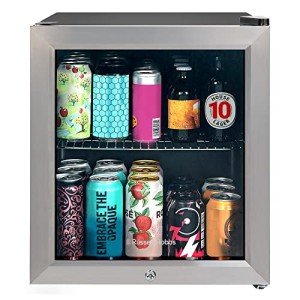11 "Faux Pas" That Actually Are Okay To Create With Your Drink Fridges

Commercial Drink Fridges: The Essential Guide for Businesses
In the competitive landscape of the food and beverage industry, maintaining the quality and availability of beverages is vital for organization success. Commercial drink fridges play a vital role in this aspect, guaranteeing that both disposable and non-perishable drinks are saved effectively, marketed appealingly, and easily accessible to customers. This short article provides an in-depth take a look at commercial drink fridges, their types, functions, and advantages, while dealing with regularly asked concerns to assist company owner in making notified choices.
Table of Contents
- 2.1. Glass Door Refrigerators
- 2.2. Undercounter Refrigerators
- 2.3. Countertop Fridges
- 2.4. Beverage Dispensers
Intro to Commercial Drink Fridges
Commercial drink fridges are specialized refrigeration systems created to shop and display a variety of beverages, including sodas, juices, beer, wine, and more. Unlike domestic refrigerators, these systems are constructed to hold up against the extensive demands of commercial environments, where they require to keep products at optimal cooling temperatures while maximizing presence and availability for clients.
Kinds Of Commercial Drink Fridges
There are different commercial drink fridges offered on the market, each catering to particular requirements and environments. Here are a few of the most common types:
2.1. Glass Door Refrigerators
- Description: These fridges feature big glass doors that offer visibility for customers while keeping the drinks cold.
- Suitable Use: Perfect for corner store, coffee shops, and restaurants that desire to display their beverage offerings.
2.2. Undercounter Refrigerators
- Description: Designed to fit under counter areas, these fridges are compact yet efficient.
- Ideal Use: Great for bars and restaurants with restricted space; they allow for easy access to drinks without inhabiting flooring space.
2.3. Countertop Fridges
- Description: Smaller systems that rest on counter tops, permitting fast access to beverages.
- Suitable Use: Suitable for coffee shops and coffee shops where staff requirement quick access to drinks for consumers.
2.4. Beverage Dispensers
- Description: These systems dispense drinks like soft drinks, juices, or iced tea directly, often geared up with several taps.
- Perfect Use: Common in fast-food dining establishments and occasions needing high-volume beverage service.
Key Features of Commercial Drink Fridges
When thinking about a commercial drink fridge, numerous key features ought to be taken into account:
- Temperature Control: Efficient cooling systems maintain ideal temperature varieties, generally between 33 ° F to 40 ° F( 1 ° C to 4 ° C), to make sure beverage
- freshness. Energy Efficiency: Many designs are designed with eco-friendly technologies, minimizing energy intake and operating expenses.
- Interior Lighting: LED lighting enhances visibility, making it simple for customers to see the available items.
- Shelving Options: Adjustable shelving enables versatile company of drinks, accommodating various bottle sizes and types.
- Security Features: Lockable doors use security against theft, which is particularly crucial in retail environments.
Benefits of Using Commercial Drink Fridges
Investing in a commercial drink fridge offers several benefits that improve organization operations:
- Improved Sales: Effective display and ease of access to beverages increase impulse purchases and overall sales.
- Quality Preservation: Proper refrigeration ensures that drinks keep their taste and freshness, which is important for client satisfaction.
- Brand Visibility: Transparent glass doors showcase your item range, improving branding and marketing efforts.
- Space Efficiency: Many designs are designed for ideal area usage in hectic commercial settings.
| Feature | Benefit |
|---|---|
| Temperature Control | Keeps drinks fresh and appealing |
| Energy Efficiency | Reduces electricity expenses and promotes sustainability |
| Interior Lighting | Draws in customers and assists in product selection |
| Adjustable Shelving | Optimizes storage based on inventory needs |
| Security Features | Secures versus theft |
Frequently asked questions
Q1: How do I select the best size of drink fridge for my company?
Picking the ideal size depends on your available area, the volume of drinks you prepare to stock, and customer traffic. Measure your designated area and think about designs that fit those measurements while fulfilling your storage needs.
Q2: Are commercial drink fridges energy-efficient?
Lots of modern-day commercial drink fridges are created with energy-saving technology and insulation to reduce energy usage. Small Glass Door Fridge to try to find the ENERGY STAR label for optimal performance.
Q3: How frequently should I preserve my fridge?
Routine maintenance is important for the longevity of your commercial drink fridge. An excellent general rule is to clean it each to 3 months. Additional checks on temperature settings and door seals need to be carried out frequently.
Q4: What temperature level should my drink fridge be set at?
Many beverage refrigeration ought to maintain a temperature level between 33 ° F and 40 ° F (1 ° C to 4 ° C) to make sure drinks are cold but not frozen.
Q5: Can I use a residential fridge for commercial functions?
While domestic fridges might work in a pinch, they are not developed for the heavy demands of commercial settings. For optimal performance and energy performance, it's best to purchase home appliances designed for commercial usage.
Conclusion
In conclusion, commercial drink fridges are a crucial investment for any service that offers beverages. With various types and features readily available, understanding the specific requirements of your service will aid in choosing the ideal design. The advantages of improved sales, quality preservation, and boosted presence can considerably contribute to a business's success. As the industry continues to evolve, having the best equipment makes sure that companies can fulfill client expectations while flourishing in a competitive marketplace.

